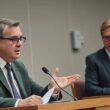The German medical community is issuing a stark warning to the ruling coalition government regarding the escalating physician shortage, urging an immediate expansion of tax-free “active retirement” benefits to include self-employed doctors. Klaus Reinhardt, President of the German Medical Association, criticized the current legislative design as short-sighted and detrimental to addressing the looming healthcare supply crisis.
Reinhardt argued that excluding independent practitioners from the program demonstrates a profound misunderstanding of the severity of the problem. He emphasized that retaining the expertise of established, privately practicing physicians is crucial to mitigating the impending shortfall in healthcare provision, particularly given the accelerating trend of physician retirements and the growing scarcity of young doctors entering the profession.
The current demographic realities within the medical field are deeply concerning. Almost 30% of specialist physicians are already aged over 60, a figure that rises to over 40% within general practice – a sector facing a particularly acute shortage, with over 5,000 vacant family doctor positions nationwide. Survey data indicates that a significant quarter of family doctors are contemplating retirement within the next five years, a void that younger colleagues are demonstrably unable to fill.
The Medical Association believes a substantial pool of experienced doctors are willing to remain active, albeit in a reduced capacity, beyond traditional retirement age. Dr. Reinhardt estimates this untapped potential could equate to approximately 20,000 additional full-time equivalent positions. He highlighted surveys revealing that 60% of general practitioners are open to prolonging their careers under adjusted conditions, primarily calling for a reduction in bureaucratic burdens and more flexible, shorter working hours.
The association believes incentivizing these continued services through tax benefits, similar to those offered under the current active retirement legislation, could prove a powerful tool. However, limiting these tax breaks to employees while barring self-employed physicians constitutes a critical oversight, potentially disincentivizing a valuable segment of the healthcare workforce and exacerbating the existing crisis. The call represents a deepening political challenge for the ruling coalition, forcing a reassessment of policies impacting essential public services.





